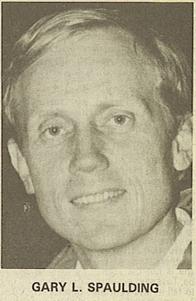
A trial of faith
Saturday, 19 June 1993
County fair evangelist to make case in court
By TOM PRICE
Truth Staff
ELKHART — Nearly a year after his arrest for trespassing at the Elkhart County 4-H Fair when he refused to buy a permit to distribute religious literature, a South Bend man this week will make his case to a jury of his peers.
The three-day misdemeanor trial of 40-year-old Gary L. Spaulding will begin Tuesday with the selection of the six-member jury. But action significant to the trial’s outcome could take place in a special hearing at 10:30 a.m. Monday in Elkhart Superior Court II.

That’s when Judge Stephen Platt will rule on a motion by Deputy Prosecutor George W. Biddlecome to limit the use of First Amendment or civil-rights reasons as a defense by Spaulding’s attorney, Gregory Ball of South Bend.
After an initial hearing last fall in the Elkhart County Court’s Goshen division, Judge Olga Stickel ruled in December that there is no significant state involvement in the Elkhart County 4 H Fair and denied a motion to dismiss trespassing charges.
If there were a significant involvement by the state, First Amendment freedoms would receive far broader protection at the privately owned fairgrounds.
But Ball, a member of the Christian Legal Society who is representing Spaulding on a pro-bono basis, could intro-duce new evidence to bolster his claim that the fair is “the equivalent of a company town.”
“In my view, the First-Amendment questions have been settled in Judge Stickel’s court,” said Biddlecome, who is newly assigned to the case. “The judge ruled Mr. Spaulding’s First-Amendment rights weren’t violated. I am not going to voluntarily allow them to re-litigate questions which have been already settled … They had ample opportunity to argue any point they feel is germane.”
But with Stickel out on an eight-week medical leave, the parties agreed to a transfer to Elkhart, where Platt will preside.
Spaulding, a [constituent] member of the Northwest United Methodist Church in South Bend, was arrested July 27 for distributing a free “Jesus newspaper” without a permit. He spent one week in jail, and was released the morning after the fair’s final night. After paying his admission, Spaulding refused to pay a $350 display fee the fair board requires of all merchants and vendors.
“What’s at stake is whether people on public thoroughfares can have free access to talking about Jesus…,” Spaulding said.”My feeling is that in the United States. . . the same thing is happening here as what happened in the Soviet Union under communism … People could not simply go out and do the work, like the Salvation Army’s sidewalk preaching.”
If convicted, Spaulding would face a maximum sentence of 12 months in prison and a $5,000 fine. If found guilty, Spaulding said he intends to appeal the decision.
“I know he is trying very hard to prove state involvement with us, but there just isn’t any,” said Elkhart County Recorder Peggy Miller, who was fair board president during the 1992 fair.
Miller and other fair officials, however, are scheduled to be called as witnesses to Spaulding’s arrest by Elkhart County police. If Platt were to re-enter the questions already resolved by Stickel, it could have an impact on the fair’s operations, possibly opening up the fairgrounds to virtually any private or commercial interest.
“What chaos,” Miller said. “I guess that would mean everyone and anyone could [distribute free-of-charge literature].”
A trial of faith (cont.)
Saturday, 19 June 1993
‘False arrests’ record to be kept from jury
By TOM PRICE
Truth Staff
ELKHART — Jurors in the trial of a South Bend man may hear his belief that the state “has no business involving itself” in marriage. But they will not learn of at least five occasions in which he was arrested in addition to July 27, 1992, at the Elkhart County 4 H Fair.
As recently as April 16 outside the Branch Davidian compound in Waco, Texas, Gary Spaulding was arrested for “proactive Christian activities which have resulted in arrests for trespass, failure to obey law-enforcement officials and the like.”
In addition, he reportedly was arrested on at least four other occasions: twice in 1990 during protests outside area abortion clinics, once in 1983 on a charge of disorderly conduct after preaching at a South Bend high school and once in 1989 on a charge of disorderly conduct after police broke up a ministry-related party.1
Before a change in venue this month, Judge Olga Stickel, of the Elkhart County Court’s Goshen division, ruled in favor of the motion by South Bend attorney Gregory Ball, a Christian Legal Society member, who is representing Spaulding on a pro-bono basis.
“Any mention of them would (be) highly prejudicial, would cause a miscarriage of justice, and should be simply prevented so as to guarantee the defendant’s fair trial rights are secured,” Ball wrote, “in particular, defendant has most recently been arrested by Texas Rangers [the FBI] in Waco, Texas, for attempting to deliver humanitarian food supplies to the Branch Davidians, and (given) the number of people who have no sympathy whatsoever for the Branch Davidians, it would be highly prejudicial for that ever to be brought to a jury’s attention.”
“Those arrests, clearly in my mind, were all false arrests,” said Spaulding, who is awaiting another court date for his arrest in Waco, where he was charged with interfering with police, a misdemeanor.
“I understand that I was the public servant. I was blocked from doing my work. They claimed that they were the public servant, the Texas Rangers, and that I was interfering with their work. They’re wrong,” Spaulding said. “They were blocking people from providing humanitarian assistance. That receives condemnation throughout the world, whether in Waco, Texas, or in Bosnia … In that light, it was a false arrest.”
Spaulding and a Olaitan Oyetunbi, also of South Bend, were arrested for trying to deliver a load of food, including baby milk, for women and children to the Branch Davidian compound.
Spaulding, and his wife, Vickie, heard radio reports of the needs inside the compound when in Waco on April 3 to participate in a demonstration with the Unorganized Militia of the United States of America, an Indianapolis-based group that actively supports the Second Amendment. In the rally, participants carried unloaded automatic and semi-automatic weapons into an area near the compound.
“In a situation like this, where there is trouble trying to find out whether we’re getting the truth on any score, we felt in our hearts we had to accept this at face value,” said Spaulding, who returned to Michiana to mount the Waco Humanitarian Convoy, raising $1,500 in supplies.
“From the first view of what was going on in Waco, it looked like a total destruction of First-Amendment rights. In the second view, you could see there was a destruction of Second-Amendment rights,” he said. “Basically, it was obvious from day one that something was gravely amiss in Waco. We were not being told the truth. There was cover-up, fraud, deceit. I sensed it immediately.”
When the raid by the Bureau of Alcohol, Tobacco and Firearms received national attention, reports first indicated that David Koresh was a self-proclaimed Messiah who was sought for allegations of child abuse. But Spaulding heard ABC Radio report that federal authorities retracted that charge. ((The charge retracted, more specifically, was that David Koresh claimed to be Jesus.))
“You would hear claims after day one that Davidian gunfire had killed four federal agents, but you never saw any footage of a Davidian gun in a window,” he said.
“I said to myself, ‘So what if someone claims to be Christ. They are a cult by whose definition? Those are not issues pertaining to public safety. The police’s only job is to involve themselves in issues of public safety. To be a cult or not to be a cult does not pertain to the police’s jurisdiction,” he said. “This was a nationwide effort to demean David Koresh.”
When Spaulding tried to deliver the food items, he said he was following through on a promise “to do everything within our power” to make sure the supplies reached their promised destination. Police, however, warned Spaulding and Oyetunbi not to try to enter the compound — a position that was not negotiable.
“We said, ‘We are not negotiating with you either … We simply ask that you don’t shoot us in the back,'” he said, “As soon as we crossed the checkpoint, we were overpowered.”
Spaulding is aware that many people might disapprove of his actions in Waco, particularly because of the Messianic claims Koresh reportedly made.
“Who Koresh was in the humanitarian effort was largely a secondary concern,” he said. “I don’t claim to know who the Branch Davidians are, nor what they stand for. My only information has been from the Branch Davidian’s worst enemies.”
Three days after Spaulding’s arrest, the Branch Davidian compound went up in flames, killing Koresh and more than 80 of his followers.
“We do feel that our humanitarian effort could have diffused the whole situation,” Spaulding said. “(Federal agents in Waco) refused to take off the face of militarized coercive provocation and to put on a human face.”
For Spaulding, several questions remain, which he hopes a government investigation will resolve.
“I would hope that the government investigation will be able to uncover the guilt on the part of the government,” he said. “If that comes short of its mark, then efforts would be directed toward a public investigation.”
“Who is going to define a religion that is approved and who is going to define a religion that is not approved? Our federal government did it in Waco, although they have no jurisdiction to deal with religious belief,” he said. “It shows me the enormous willingness of our government to lie, to treat people as military targets, and to paint religious belief as somehow objectionable, just simply by virtue of (being) religious belief.”
He even can sympathize with the response of the Branch Davidians to armed federal agents.
“There is a line in all of our hearts where we will say, ‘You pushed us far enough. We must push back, defensively,'” said Spaulding, who told The Associated Press, “If I am approached with deadly force, I will respond with deadly force. If they were coming through my roof, I would fire.”
Although his previous actions are not of concern in this trial, Spaulding is aware that others will evaluate his motives at the Elkhart County 4 H Fair by these actions.
- As alluded to earlier in this document, here is where the police falsified the record to discredit me before the public by adding a phony arrest to my rap sheet that never occurred. Our friend, Jerome Steed, was being beaten by police with night sticks while face-down on the sidewalk, hands cuffed behind his back, when Peter & I walked out of the house where we had been holding an inner-city Black Youth Christian outreach. Immediately after witnessing this police brutality we went to Headquarters to file a remonstrance. The police’s response was to try to paint me as the criminal, as above. ¶I absorbed this persecution patiently, along with others yet to come, including the false arrest at the Mount Carmel Concentration Camp near Waco, Texas. But after witnessing the terrorism in Waco, the need to corner me & neutralize me was overwhelming in the minds of the police, until the day they came for my children, inferring that my children were in danger from me, which I could no longer absorb, but responded by leaving the country. [↩]

